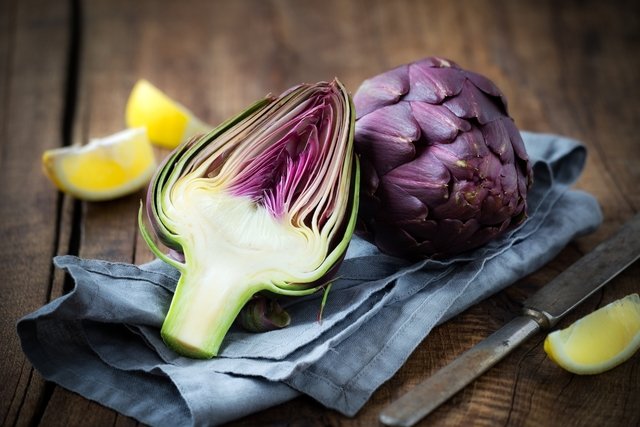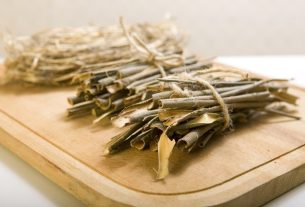The artichoke is a medicinal plant rich in water, fiber and flavonoids, in addition to having good amounts of vitamin C and minerals, such as potassium and phosphorus, having antioxidant, anti-inflammatory, diuretic, probiotic and antidyspeptic (combats poor digestion) action. ).
Known as hortense artichoke, common artichoke or eating artichoke, the plant helps reduce cholesterol and glucose levels in the blood, preventing diseases such as obesity, heart attack and diabetes. Furthermore, the plant also promotes weight loss, as it helps control hunger and eliminate excess fluid from the body.
Fresh artichokes can be found in some supermarkets or markets and their leaves are sold in health food stores or pharmacies. Artichokes can be consumed in different ways: cooked, in salads, roasted, in juices or teas. Learn how to prepare artichoke tea.

Main benefits
The artichoke has several beneficial properties for health, such as:
1. Promote weight loss
Artichokes are rich in inulin, a fiber present in many vegetables that helps with weight loss, as it is digested more slowly, prolonging satiety and reducing hunger. Find out how to use artichokes to lose weight.
Because it contains low amounts of calories and promotes the elimination of excess body fluid, artichokes are a great option to add to weight loss diet menus. See how to go on a diet to lose weight.
2. Lower cholesterol
Because it is rich in fiber, such as inulin and pectin, artichokes help to reduce the absorption and increase the elimination of fat in the feces, promoting the reduction of “bad” cholesterol levels, LDL, and total cholesterol in the blood.
Furthermore, artichokes are rich in antioxidant compounds, such as flavonoids, carotenoids and vitamin C, which prevent the formation of free radicals and prevent the formation of fatty plaques in the blood, preventing atherosclerosis.
3. Prevent diabetes
Artichokes are a food with a low glycemic index as they have excellent amounts of fiber and proteins, which help regulate blood glucose and insulin levels, thus preventing diabetes.
4. Control high blood pressure
Eating foods rich in potassium, such as artichokes, increases urine production that removes excess sodium from the body, helping to control and prevent high blood pressure. Discover other suggestions for keeping high blood pressure under control.
Artichokes are also rich in antioxidants, such as flavonoids and carotenoids, which inhibit the excessive production of free radicals, maintaining artery health and preventing high blood pressure. See a list of other foods rich in potassium.
5. Reduce wrinkles and sagging
Because it is rich in bioactive compounds, such as vitamin C, flavonoids and carotenoids, artichokes help fight free radicals and increase collagen production, reducing wrinkles and sagging. Discover some foods that increase collagen production.
Furthermore, artichokes are rich in fiber that balances blood sugar levels, preventing cell inflammation and, consequently, sagging and premature aging.
6. Detoxify the liver
Artichokes are a great source of antioxidant compounds, such as flavonoids and polyphenols, which protect the liver and help eliminate toxins from the body through urine, feces or sweat. Find out how to follow a diet to detoxify your liver.
By protecting and improving liver functions, artichokes also alleviate symptoms of poor digestion, such as nausea, malaise and abdominal pain.
7. Fight constipation
Because it is rich in fiber and water, artichokes help in the formation of fecal cake and the elimination of feces, making it a great food to combat constipation.
Artichokes are also rich in inulin, a type of prebiotic fiber that serves as food for the beneficial bacteria in the intestine, keeping the intestinal flora healthy. Discover other foods rich in inulin.
Nutritional information table
The following table shows the nutritional composition of 100 g of cooked artichokes:
It is important to highlight that the benefits of artichokes are achieved when maintaining a balanced and healthy diet and regular physical activity.
To find out how to consume artichokes in a healthy diet, make an appointment with the nutritionist closest to you:
How to consume
Artichokes can be consumed in their natural form, roasted, sautéed, in paste or raw in salads, juices, teas, or as a supplement in capsules.
Artichoke supplements in capsules can be taken before or after the main meals of the day, along with a glass of water, ranging from 400 to 6000 mg of this supplement per day.
It is important to remember that artichoke supplementation must be done under the supervision of a doctor or other health professional specialized in the use of medicinal plants. Understand better how to use artichoke supplements.
When not to consume
Artichokes should not be consumed by people with gallbladder problems, hepatitis or liver cancer without medical advice. The consumption of this plant is not recommended for those using anticoagulant medications, because the artichoke can reduce the action of these medications.
Furthermore, artichokes should not be consumed by pregnant or breastfeeding women and by children under 12 years of age.
Possible side effects
Consumption of supplements and teas prepared with artichokes can cause stomach pain, diarrhea, gas, nausea, weakness and heartburn in some people.
Artichoke recipes
Some healthy and tasty recipes with artichokes are tea and grilled artichokes:
1. Artichoke tea
Ingredients:
- 1 liter of water;
- 1 teaspoon (5 to 6g) of dried artichoke leaves.
Preparation mode:
Boil the water in a pan, or kettle, and then turn off the heat. Add the artichoke leaves to the water and let it rest for 5 to 10 minutes. Strain the tea, let it cool and drink up to 3 cups a day.
2. Grilled artichokes
Ingredients:
- 2 large artichoke flowers;
- 1 lemon;
- ¼ cup of olive oil;
- 4 cloves of garlic;
- 1 liter of filtered water;
- 1 teaspoon of salt;
- ½ teaspoon of black pepper.
Preparation mode:
Place a pan with water and ½ teaspoon of salt over high heat. Cut the stems of the artichokes close to the base and rub the lemon to prevent them from darkening. Cut the ends with a knife and trim the ends of the leaves with scissors. Cut the artichokes in half and remove the skins. Wash the artichokes well. When the water is boiling, add the artichokes and a little lemon juice. Cover the pan and cook over low heat for 25 to 30 minutes or until they are soft.
Afterwards, drain the artichokes well and in a container, squeeze the remaining lemon and mix with the pepper, olive oil, garlic and salt, and mix well into the artichokes. Heat a non-stick frying pan and add the artichokes, sautéing for 5 to 10 minutes, turning and brushing with the sauce a few times until the tips of the leaves begin to darken. Wait for it to cool a little and serve.

Sign up for our newsletter and stay up to date with exclusive news
that can transform your routine!
Warning: Undefined array key "title" in /home/storelat/public_html/wp-content/plugins/link-whisper-premium/templates/frontend/related-posts.php on line 12
Warning: Undefined array key "title_tag" in /home/storelat/public_html/wp-content/plugins/link-whisper-premium/templates/frontend/related-posts.php on line 13



